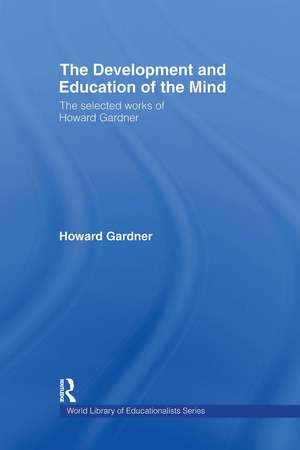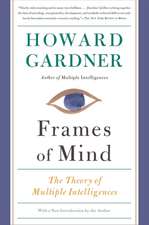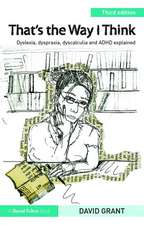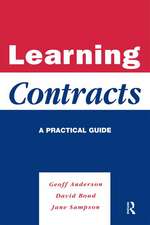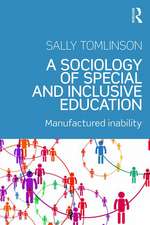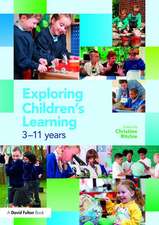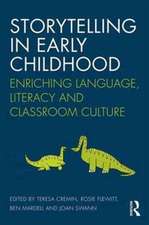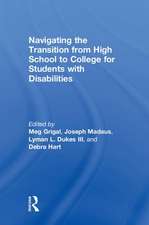The Development and Education of the Mind: The Selected Works of Howard Gardner: World Library of Educationalists
Autor Howard Gardneren Limba Engleză Hardback – 24 noi 2005
Trained originally as a psychologist at Harvard University, Howard Gardner begins with personal sketches and tributes to his major teachers and mentors. He then presents the work for which he is best-known – the theory of multiple intelligences – including a summary of the original theory and accounts of how it has been updated over the years. Other seminal papers featured include:
- education in the arts
- the nature of understanding
- powerful ways in which to assess learning
- broad statements about the educational enterprise
- how education is likely to evolve in the globalised world of the twenty-first century.
| Toate formatele și edițiile | Preț | Express |
|---|---|---|
| Paperback (1) | 242.50 lei 6-8 săpt. | |
| Taylor & Francis – 24 noi 2005 | 242.50 lei 6-8 săpt. | |
| Hardback (1) | 1057.89 lei 6-8 săpt. | |
| Taylor & Francis – 24 noi 2005 | 1057.89 lei 6-8 săpt. |
Din seria World Library of Educationalists
-
 Preț: 323.07 lei
Preț: 323.07 lei -
 Preț: 291.40 lei
Preț: 291.40 lei -
 Preț: 311.37 lei
Preț: 311.37 lei -
 Preț: 339.37 lei
Preț: 339.37 lei -
 Preț: 373.56 lei
Preț: 373.56 lei -
 Preț: 333.88 lei
Preț: 333.88 lei -
 Preț: 306.24 lei
Preț: 306.24 lei - 18%
 Preț: 1053.47 lei
Preț: 1053.47 lei -
 Preț: 476.60 lei
Preț: 476.60 lei -
 Preț: 480.46 lei
Preț: 480.46 lei - 18%
 Preț: 1000.27 lei
Preț: 1000.27 lei - 18%
 Preț: 1059.45 lei
Preț: 1059.45 lei -
 Preț: 397.88 lei
Preț: 397.88 lei - 18%
 Preț: 1058.65 lei
Preț: 1058.65 lei - 16%
 Preț: 242.50 lei
Preț: 242.50 lei - 18%
 Preț: 1166.01 lei
Preț: 1166.01 lei - 25%
 Preț: 851.46 lei
Preț: 851.46 lei -
 Preț: 404.67 lei
Preț: 404.67 lei - 13%
 Preț: 303.61 lei
Preț: 303.61 lei -
 Preț: 482.35 lei
Preț: 482.35 lei - 26%
 Preț: 847.31 lei
Preț: 847.31 lei - 18%
 Preț: 1000.27 lei
Preț: 1000.27 lei -
 Preț: 441.54 lei
Preț: 441.54 lei - 18%
 Preț: 1171.89 lei
Preț: 1171.89 lei - 18%
 Preț: 1328.97 lei
Preț: 1328.97 lei -
 Preț: 438.65 lei
Preț: 438.65 lei -
 Preț: 402.98 lei
Preț: 402.98 lei - 18%
 Preț: 1275.71 lei
Preț: 1275.71 lei - 18%
 Preț: 1225.22 lei
Preț: 1225.22 lei - 22%
 Preț: 294.60 lei
Preț: 294.60 lei - 26%
 Preț: 822.54 lei
Preț: 822.54 lei - 18%
 Preț: 1166.01 lei
Preț: 1166.01 lei -
 Preț: 478.41 lei
Preț: 478.41 lei - 26%
 Preț: 765.01 lei
Preț: 765.01 lei - 18%
 Preț: 1222.36 lei
Preț: 1222.36 lei -
 Preț: 441.96 lei
Preț: 441.96 lei - 18%
 Preț: 1060.87 lei
Preț: 1060.87 lei - 25%
 Preț: 822.91 lei
Preț: 822.91 lei - 15%
 Preț: 444.50 lei
Preț: 444.50 lei - 26%
 Preț: 822.36 lei
Preț: 822.36 lei
Preț: 1057.89 lei
Preț vechi: 1290.10 lei
-18% Nou
Puncte Express: 1587
Preț estimativ în valută:
202.45€ • 210.16$ • 168.81£
202.45€ • 210.16$ • 168.81£
Carte tipărită la comandă
Livrare economică 24 martie-07 aprilie
Preluare comenzi: 021 569.72.76
Specificații
ISBN-13: 9780415367295
ISBN-10: 0415367298
Pagini: 280
Ilustrații: 1 table
Dimensiuni: 156 x 234 x 21 mm
Greutate: 0.54 kg
Ediția:1
Editura: Taylor & Francis
Colecția Routledge
Seria World Library of Educationalists
Locul publicării:Oxford, United Kingdom
ISBN-10: 0415367298
Pagini: 280
Ilustrații: 1 table
Dimensiuni: 156 x 234 x 21 mm
Greutate: 0.54 kg
Ediția:1
Editura: Taylor & Francis
Colecția Routledge
Seria World Library of Educationalists
Locul publicării:Oxford, United Kingdom
Public țintă
Postgraduate and UndergraduateCuprins
1. Influences 2. The Pathbreaking Work of Jean Piaget 3. Jerome S. Bruner as Educator: Project Zero: Nelson Goodman's Legacy in Arts Education 4. Norman Geschwind Creative Genius 5. Developmental Psychology after Piaget: An approach in Terms of Symbolization 6. M.I. Theory 7. Beyond the IQ: Education and Human Development 8. Developing the Spectrum of Human Intelligences 9. Reflections on Multiple Intelligences: Myths and Messages 10. Who Owns Intelligence? 11. Multimedia and Multiple Intelligences 12. The Three Faces of Intelligence 13. M.I. after Twenty Years 14. Arts Education 15. Artistic Intelligences 16. Zero-Based Arts Education: An Introduction to Arts Propel 17. Illuminating Comparisons in the Arts 18. The Key in the Slot: Creativity in a Chinese key 19. Disciplinary Understanding The Unschooled Mind: Why Even the Best Students in the Best Schools do not Understand 20. Teaching for Understanding in the Disciplines - and Beyond 21. Multiple Approaches to Understanding 22. Education General 23. Assessment in Context: The Alternative to Standardised Testing 24. The Age of Innocence Reconsidered: Preserving the Best of the Progressive Traditions in psychology and Education 25. How Education Changes: Considerations of History, Science and Values 26. An Education for the Future: The Foundation of Science and Values 27. The Ethical Responsibilities of Professionals
Recenzii
'Every so often you encounter a book that excites you so much you can't stop talking about it. You urge others to read it and are tempted to buy multiple copies to make sure they do. Howard Gardner's selection of his own works is one of those books. ... It's in the classroom that Gardner's theories have most appeal for they confirm what teachers know from their everyday experience: that students think and learn in many different ways. ... I cannot recommend it strongly enough.' - Tim Brighouse, Times Educational Supplement, Book of the Week
Descriere
Leading psychologist and educator Howard Gardner brings together and introduces a selection of his key writings from the last thirty years and demonstrates how broad psychological perspectives can bring insights to the processes of education.
